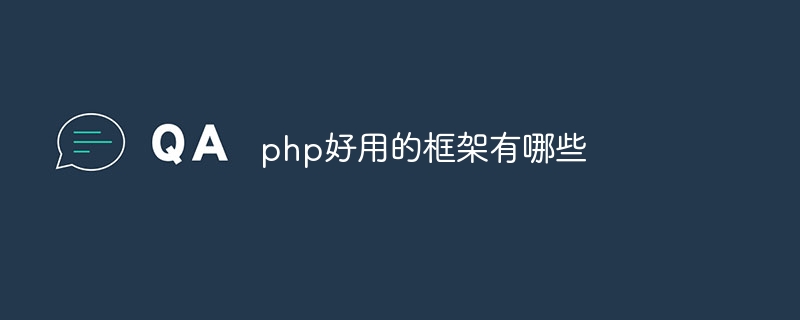Home >Backend Development >PHP Problem >What are the useful frameworks for PHP?
What are the useful frameworks for PHP?
- zbtOriginal
- 2023-08-02 14:30:332382browse
php useful frameworks include Laravel, Symfony, CodeIgniter, CakePHP and Zend Framework. 1. Laravel, which includes functions such as database migration, routing, authentication, and caching, and has an active community that provides a large number of tutorials and extension packages; 2. Symfony, which provides a series of components, including form processing, caching, validation, and Security and other functions; 3. CodeIgniter, which has the characteristics of simple configuration and fast operation.

The operating environment of this tutorial: windows10 system, php8.1.3 version, DELL G3 computer.
PHP is a widely used back-end programming language with powerful features and flexibility. In order to improve development efficiency and simplify the development process, many PHP developers use frameworks to build their applications. A framework is a software tool that provides a set of reusable components and functions to help developers write code more efficiently.
In the PHP world, there are many useful frameworks for developers to choose from. Below we will introduce some popular PHP frameworks that are not only easy to learn and use, but also powerful and suitable for projects of all sizes.
1. Laravel
Laravel is one of the most popular PHP frameworks currently. It has elegant syntax and simple and easy-to-use interface, providing developers with rich functions. Laravel includes functions such as database migration, routing, authentication, and caching, and has an active community that provides a large number of tutorials and expansion packs.
2. Symfony
Symfony is a highly customizable PHP framework that uses a modular approach to organize code. Symfony provides a series of components, including form processing, caching, validation and security functions. By using Symfony, developers can build highly scalable and maintainable applications.
3. CodeIgniter
CodeIgniter is a lightweight PHP framework that is widely used for developing small to medium-sized applications. It has the characteristics of simple configuration and fast operation, suitable for beginners and developers with high performance requirements. CodeIgniter provides database abstraction, form validation, caching, session management and other functions.
4. CakePHP
CakePHP is a fast and simple PHP framework that adopts the principle of "convention over configuration" to allow developers to focus more on business Logic rather than code details. CakePHP provides database access, template engine, form processing and security validation and other functions, suitable for building medium to large applications.
5. Zend Framework
Zend Framework is a powerful PHP framework suitable for building complex web applications. It provides a rich set of libraries and components, including database access, email processing, authentication, caching and other functions. Zend Framework follows the object-oriented programming philosophy and enables developers to create flexible and scalable applications.
Summary:
The frameworks mentioned above are just the tip of the iceberg in the PHP world. There are many other useful frameworks such as Yii, Slim and Phalcon. It is very important to choose the framework that suits your project. Developers can decide which framework to use based on the size of the project, needs and personal preferences. No matter which framework you choose, be sure to learn and master its basic concepts and working principles so that you can better utilize the features of the framework to improve development efficiency and code quality. .
The above is the detailed content of What are the useful frameworks for PHP?. For more information, please follow other related articles on the PHP Chinese website!

